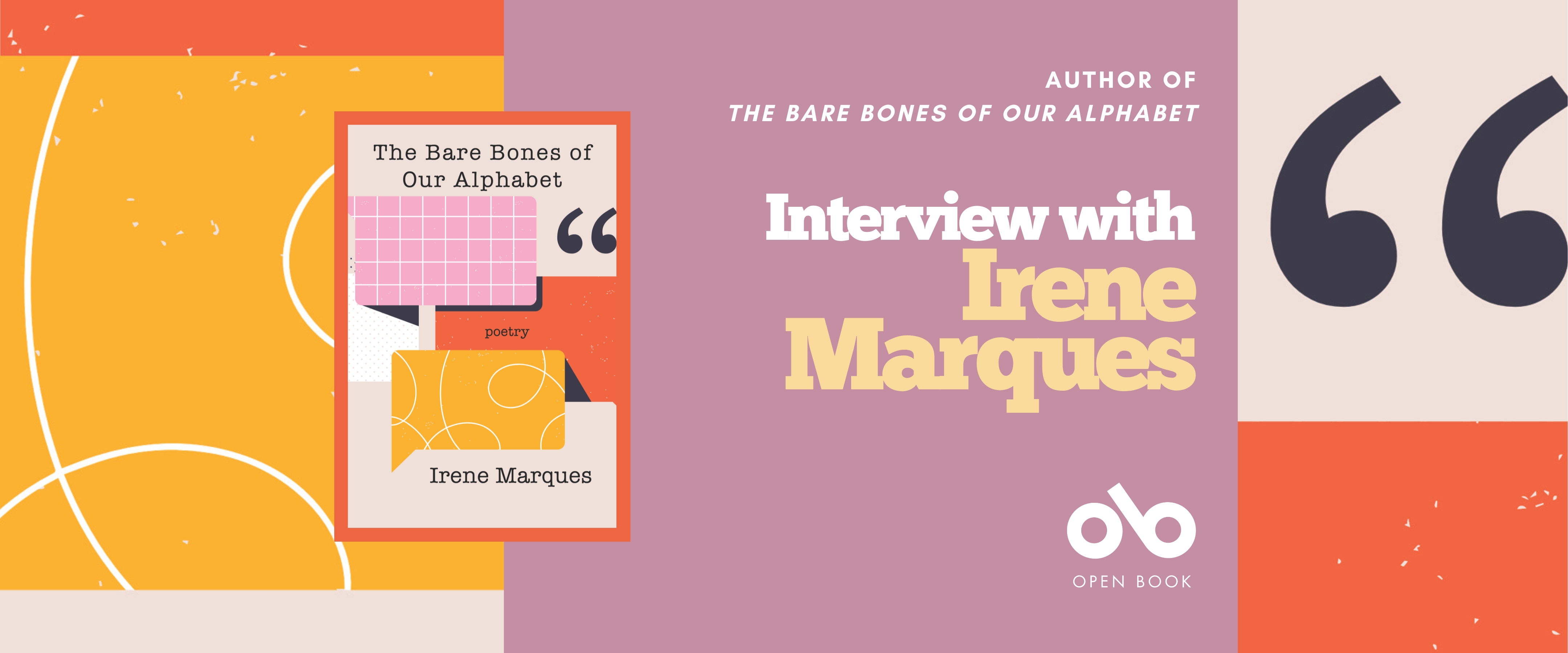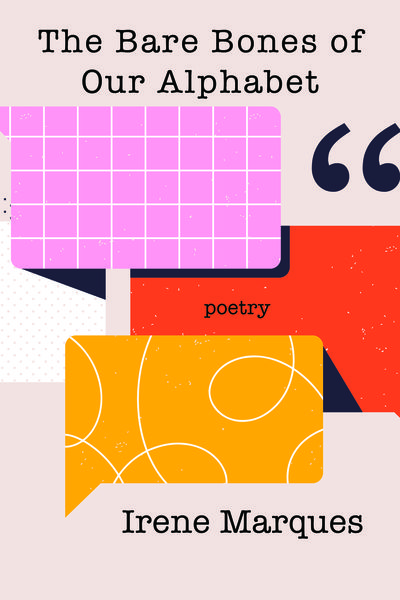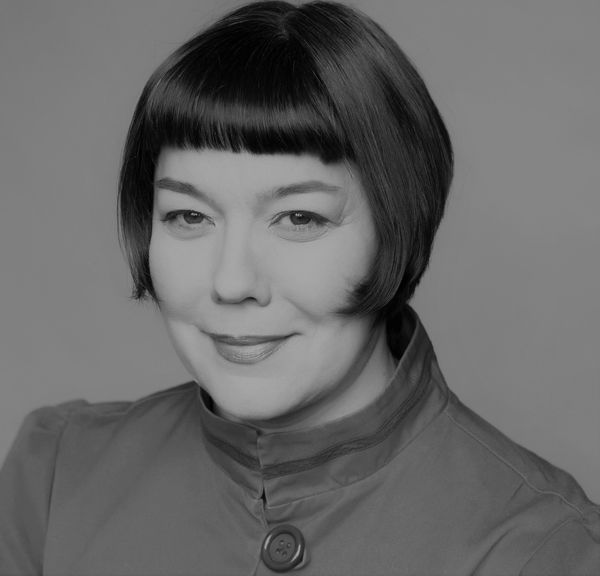A New Poetry Collection from Irene Marques Invites the Reader to Re-Enter Their Truly Bare Bones
Our featured poet today, Irene Marques, is an internationally renowned academic and author, with her many works published in a multitude of languages. In her latest collection, Marques focuses on "the desire to find a language that can tell the most about our existence." It is a heady work concerned with the tongues that a poet speaks in, the way of thinking that defines their process, and the traps that we fall into when trying to rationalize our way through art.
In The Bare Bones of Our Alphabet (Mawenzi House), we are shown how to perceive spontaneously, to avoid those traps that occur when a poet finds themselves caught up in their own rigid beliefs and systems, even if they're unaware of it. This digs down into the very construction of our languages and alphabets, and how we can see through the patterns and misleading pathways that they can set.
Check out this Line & Lyric Poetry interview with the author about her fascinating new collection, right here on Open Book!
Open Book:
Can you tell us a bit about how you chose your title? If it’s a title of one of the poems, how does that piece fit into the collection? If it’s not a poem title, how does it encapsulate the collection as a whole?
Irene Marques:
Titles are very important to me and I give them significant attention and thought. Often, when I am writing a poetry collection or a novel or a work in any other genre, I have a few titles that I note down as possibilities and which are based on the idea/ideas/themes (in terms of content and linguistic aesthetic) that I plan to tackle in the work. As I write more and more and my writing takes a direction of its own—this happens a lot in writing and it is one of the most fulfilling aspects of being a writer—I may opt for or adapt one of those titles or choose a completely different one. Sometimes the title is there—dancing in my mind—before I start writing the work. It is as if there is something in me (consciously or unconsciously) that wants to be fed and won’t go away until I give it the good it craves. The title for this collection is a stand-alone title. It’s not a title of any poem in the collection, although the word “alphabet” and “bones” or the expression “my breathing darling alphabet” appear frequently in the collection. Most of the poems in this work deal with the idea that language—ethical, thoughtful, liberating, directing language—is fundamental for humans to construct a society that allows for love, friendship and trust to blossom. Without this type of language, it becomes difficult to build a true community. I elaborate on this in the next question.
OB:
Was there a question or questions that you were exploring, consciously from the beginning or unconsciously and which becoming clear to you later, in this collection?
IM:
As I was just saying above, the primary concern of this collection is language. What can language do for the betterment of our society? How can it liberate us and imprison us? How can it make us see (truly see), understand, love, build community? What are the benign and malign powers of language, of story telling? How can the eschewing of a calculated, habitual language and mode of telling, which we often see in our world of dirty politics and social media, pave the way for a more wholesome world and human being—a human that can be spontaneous, find truth (vision) in the moment and arrive, experience awe and surprise? How can we disentangle ourselves from a dirty rhetoric that is mostly concerned with self-gain, driven by an individualistic, capitalistic ethos? How can we speak with what Hélène Cixous (the French contemporary feminist) calls the non-rational intelligences (emotion, instinct, spirit, unconscious, etc.), those eyes that see better, see deeply and refuse to be fooled by superficial make-belief, that bad-faith alphabet that we are often pushed to believe in and follow? These are some of the central questions I tackle in The Bare Bones of Our Alphabet and many of the titles of individual poems speak to this, such as “The Potential of Verbs”, “For the Love of Words”, “Words Calling”, “I Do Not Speak”, “The Economics of Linguistic Exchange”, “There Are No Words”, etc. The intention is to deconstruct language, discourse, rhetoric, debunk codes of saying and writing that fabricate dichotomous worlds of self and other, of worthy and unworthy, of man, woman or another body, of tree and men, of poor and rich, so that we can see ourselves as part of the same “community”, the same living entity, an entity en route to becoming something else, because we die and may be (are) reborn in other “matter”, another “body”, like Walt Whitman might say.
OB:
Who did you dedicate the collection to and why?
IM:
My dedications read as follows: “To those who use the word with care and are open to its benign powers” and “To my mother and father who taught me poetry: the poetry of a life that was difficult but also beautiful”. The first dedication is self-explanatory given what I say above about the content of the collection and my concern for a careful language that can build a better world. The second dedication honours my parents who were born and lived in Portugal all their lives under very difficult conditions, products of a highly Catholic culture and a country with a long history of colonialism that endured a fascist regime for almost half a century. My parents were poor, had ten children and my brothers were forced to go to the colonial wars in Africa by the colonial fascist regime in the 1960’s and 70’s. I am the youngest in the family and I grew up hearing stories from my parents, my mother especially, about their trials and tribulations. My mother’s eyes would tear up when telling her many life sagas, or those of people around her, like her own mother Beatriz, a single woman who had two daughters out of wedlock in the early 1920’s fathered by the only man she ever had relations with, and the difficulties she had to endure as a result. I was deeply affected by these stories where suffering, stigma, oppression, resilience and beauty intermingled. My love for writing, for story telling, the power and beauty I see in story telling in various forms, my belief in its capacity to awaken us to a higher consciousness and the possibilities that it contains to bring about positive societal change, come, to a great extent, from that familial and cultural context and I always like honour it.
Your CanLit News
Subscribe to Open Book’s newsletter to get local book events, literary content, writing tips, and more in your inbox
OB:
Is there an individual, specific speaker in any of these poems (whether yourself or a character)? Tell us a little about the perspective from which the poems are spoken.
IM:
There are many speakers in the collection. Some poems have a first-person point of view (“I”), others have a third-person point of view (using “she” or “they”) or still the second-person point of view (“you”). My intention in doing this is to reveal a connection between the “I”, the “You”, the “She”, the “He”, the “They”, in other words, the “I” is always connected to all other entities of this world (and not just human entities). This use of multiple points of view links to my primary concern in the collection: the idea that the language spoken by each of us affects others and that the way we speak/write leads to certain thoughts and then actions towards those others, and thus the importance of using language carefully and ethically. By using different points of view, I am also forcing myself and (hopefully) the readers to see themselves in that collective light, enter a sort of consolidated ontological terrain that allows them to reflect about their words, the consequences of their actions—how they affect others, how they cannot in fact “be” without the many “others” (human and more than human). Poetry or any other creative writing genre, has, in my view, a social responsibility, and should serve to create empathy, bring human beings closer to imagining themselves in the shoes of others, in relation to others. Writing should convey something of significance in that respect.
OB:
What advice would you give to an emerging or aspiring poet?
IM:
I would say reading a lot is fundamental—and reading from a vast array of poets/writers, even those you may think you have nothing in common with. Otherwise, you are stuck in the same isolated, individualistic and monocultural ethic and aesthetic lens. I just finished reading all the poetry of Adélia Prado, the contemporary Brazilian poet, who recently won the biggest prize for writers in the Portuguese language (Camões Prize), and was immensely affected by her. I read her in Portuguese and English. As I read her in Portuguese, I would often encounter a word, an expression, experience a feeling, arrive at an idea and then write a poem based on that. In fact, the collection of poetry I just finished was written mostly this way and inspired by Prado. This does not mean I am plagiarizing Prado, because surely, we take the words of others and give it a new spin, a direction that our own world vision, inner inclinations and life experiences demand. I also think that it is essential to read in other languages or in translation in order to push the language you write in beyond its current capacities. Poetry and different national literatures feed off one another and need one another to grow in innovative ways. The Anglophone world (Canada included) seems pretty isolated within itself reading mostly from the Anglo tradition, which creates sameness and predictability. I have written an academic article about this matter, which I consider very important for the promotion of real diversity in the Canadian literary landscape titled “The Case for Literary Extroversion and Human Consciousness Expansion in Canadian Literature: Writing, Identity, and Belonging beyond the Anglo-Saxon Ethic and Aesthetic” (in Reconstructions of Canadian Identity: Towards Diversity and Inclusion (Eds Vander Tavares and Maria João Maciel Jorge. Winnipeg: University of Manitoba Press, 2024).
OB:
What are you working on next?
IM:
I am writing a memoir, a genre very much in fashion at the moment, and we must always question fashions, literary or otherwise. They are part of what Michel Foucault would call accepted “regimes of truth”. This is to say that this memoir, along the same vein of what I do in The Bare Bones of Our Alphabet, explores different contexts related to rhetoric, language and truth—how the latter is fashioned according to the current, accepted body-politic. It looks at rhetorics and deceit as displayed in various ways in our social institutions and outlets: politics, universities, the literary industry, social media networks, etc. No more can be said!
___________________________________
Irene Marques holds a PhD in Comparative Literature, a Masters in French Literature, a Masters in Comparative Literature and a Bachelor of Social Work. She is a bilingual writer (English and Portuguese) and Lecturer at Toronto Metropolitan University where she teaches literature, literary theory and creative writing. She has taught at various other universities in Toronto including University of Toronto, York University, and OCAD University. In 2007, she held a Mellon Postdoctoral Research Fellowship at the University of the Witwatersrand, South Africa. Before devoting herself entirely to academia and writing, she worked in various social services fields for over fourteen years. Her published creative writing works include Wearing Glasses of Water (poetry, 2007), Habitando na Metáfora do Tempo (short stories, 2009), The Perfect Unravelling of the Spirit (poetry, 2012), The Circular Incantation (poetry, 2013), My House is a Mansion (novel, 2015), Daria (novel, 2021) and Uma Casa no Mundo (novel, 2021), which won Prémio Imprensa Nacional/Ferreira de Castro in Portugal. Her academic publications include the manuscript Transnational Discourses on Class, Gender and Cultural Identity (Purdue University Press, 2011) and numerous articles in international journals or scholarly collectives. She was born and raised in Portugal and moved to Canada at the age of 20.







